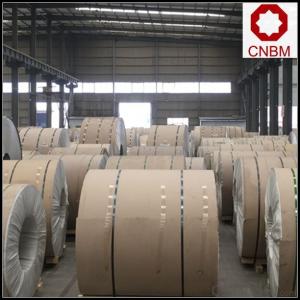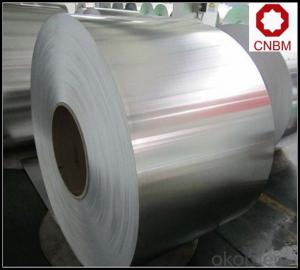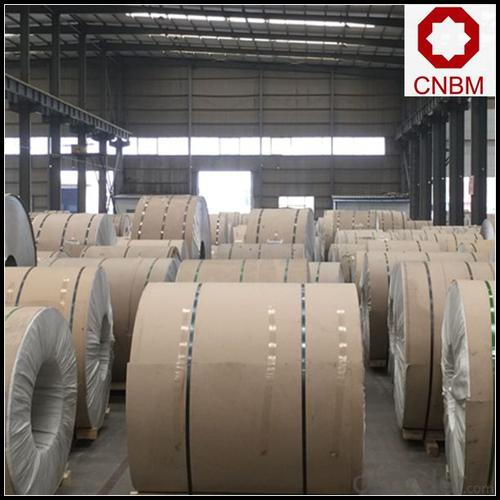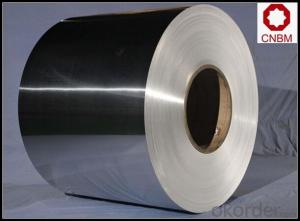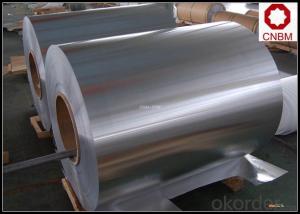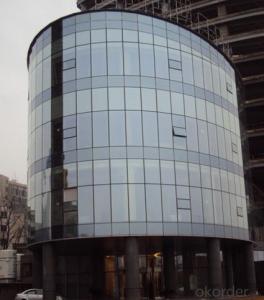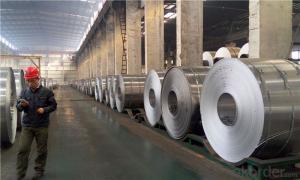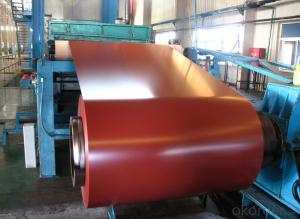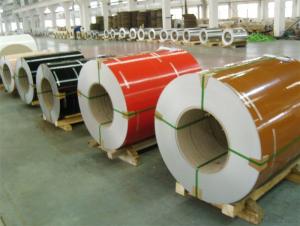Aluminum Coil Spool - Cold Rolling Gutter Aluminum Coil 3003 3004 3105
- Loading Port:
- Shanghai
- Payment Terms:
- TT OR LC
- Min Order Qty:
- 5 m.t.
- Supply Capability:
- 10000 m.t./month
OKorder Service Pledge
OKorder Financial Service
You Might Also Like
Specification
1. Specification of Cold Rolling Gutter Aluminum Coil 3003 3004 3105
Alloy: 1050, 1060, 1100, 3003, 3004, 3005, 3105, 5005, 5052, 5083, 5754
2) Temper: Various status
3) Thickness: 0.3-150mm
4) Width: 300-1950mm
5) Length: Under9500mm/ Coil
6) Weight: 2.5-5.0 tons per coil
7) Dimensions and weight can be produced according to clients' specifications.
8) Inner Diameter: 505mm, 605mm
9) Packing: Export standard, wooden pallet.
10) Delivery time: 20 days
11) Minimum order quantity: 5 tons per size.
12) The term of payment: T/T, irrevocable L/C at sight.
13) Surface: Bright
14)Origin: China
2. Application of Cold Rolling Gutter Aluminum Coil 3003 3004 3105
(1).Interior: wall cladding, ceilings, bathrooms, kitchens and balconies, shutters, doors...
(2).Exterior: wall cladding, facades, roofing, canopies, tunnels,column covers , renovations...
(3).Advertisement: display platforms, signboards, fascia, shop fronts...
3. Feature of Cold Rolling Gutter Aluminum Coil 3003 3004 3105
*Such coil is specially designed to replace aluminum ingot, due to the high export tax of aluminum ingot, the coil has better price than ingot.
*This type of coil can fit customer's remelting furnace just like ingot, no need to make any change to the production line that was previously used for ingot. The standard coil size and weight is very suitable for the feed gate of furnace.
*This type of coil causes less material wastage than ingot when remelted.
*Our coil is made directly from ore, no need to go though the ingot making process, quality is much better than other suppliers who use ingot scrap to make coil.
Be free from Oil Stain, Dent, Inclusion, Scratches, Stain, Oxide Dicoloration, Breaks, Corrosion, Roll Marks, Dirt Streaks and other defect which will interfere with use
4. Certificate:
SGS and ROHS(if client request, paid by client), MTC(plant provided), Certificate of Origin(FORM A, FORM E, CO), Bureau Veritas and SGS (if client request, paid by client), CIQS certificate
5. Image of Cold Rolling Gutter Aluminum Coil 3003 3004 3105
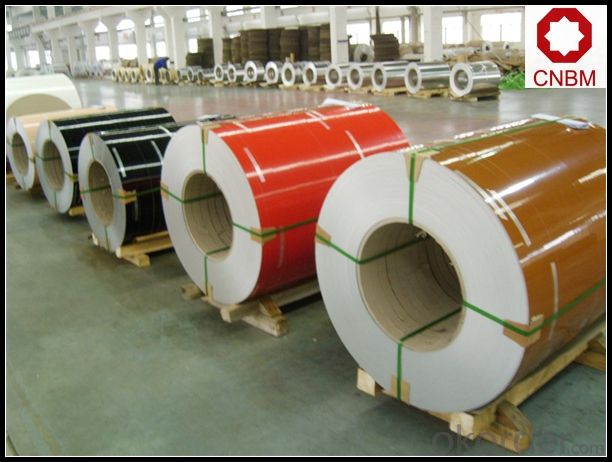
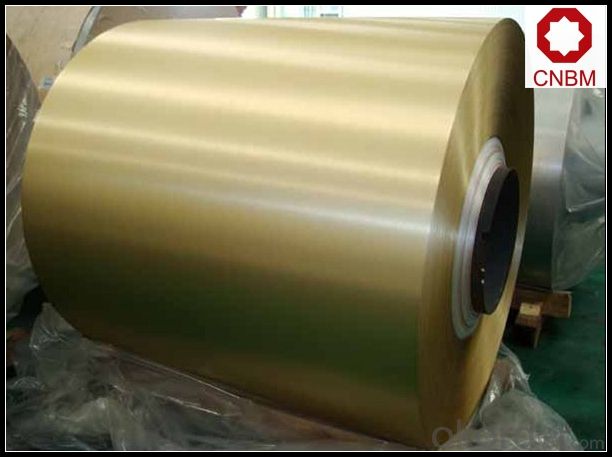
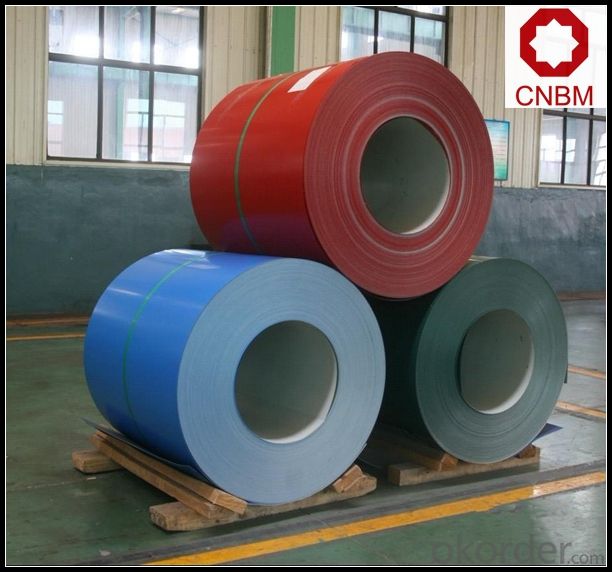
6. Package and shipping of Cold Rolling Gutter Aluminum Coil 3003 3004 3105
eye to wall
eye to the wall
with wood pallet (wooded case also available)
7. FAQ
1) What is the delivery time?
Dpends on actual order, around 20 to 35 days
2)What is the QC system:
We have QC staff of 20 persons and advanced equipment, each production is with MTC traced from Aluminum ingot lot.
3) What market do you mainly sell to?
Australia, America, Asia, Middle East, Western Europe, Africa etc
- Q: What are the potential applications of coil-anodized aluminum coils?
- Coil-anodized aluminum coils have a wide range of potential applications due to their unique properties and advantages. Here are some of the key potential applications: 1. Architectural: Coil-anodized aluminum coils can be used in architectural applications such as cladding, roofing, and facades. The anodized coating provides enhanced durability, weather resistance, and color stability, making it suitable for exterior use in different climates. The coils can also be shaped and formed into various architectural elements, offering design flexibility. 2. Transportation: The lightweight nature of coil-anodized aluminum makes it ideal for transportation applications. It can be used for manufacturing parts and components in automotive, aerospace, and marine industries. The anodized coating enhances the corrosion resistance, making it suitable for exterior components and structures. 3. Electronics: Coil-anodized aluminum coils can be utilized in electronics manufacturing. The anodized coating provides excellent electrical insulation, which is crucial in applications requiring high conductivity and insulation. It can be used for manufacturing components like heat sinks, casings, and connectors. 4. Signage and displays: The vibrant and long-lasting colors obtained through coil-anodizing make it an ideal material for signage and displays. The anodized coating ensures color stability against UV radiation and harsh weather conditions, making it suitable for both indoor and outdoor applications. It allows for the creation of eye-catching and durable signage and displays. 5. Furniture and interior design: Coil-anodized aluminum coils can be used in the manufacturing of furniture and interior design elements. The anodized coating provides a smooth, durable, and scratch-resistant surface, making it suitable for applications like tables, chairs, wall panels, and decorative elements. The wide range of available colors and finishes allows for versatile design possibilities. 6. Industrial applications: Coil-anodized aluminum coils can find applications in various industrial sectors. The anodized coating provides enhanced corrosion resistance, which is beneficial in industries like chemical processing, food processing, and pharmaceuticals. It can be used for manufacturing tanks, containers, and equipment that require resistance against harsh chemicals and environments. 7. Energy and sustainable applications: The lightweight nature and durability of coil-anodized aluminum make it suitable for energy and sustainable applications. It can be used in manufacturing solar panels, heat exchangers, and other energy-related components. The anodized coating provides protection against weathering and corrosion, ensuring long-term performance. Overall, the potential applications of coil-anodized aluminum coils are extensive and diverse, ranging from architectural and transportation to electronics, signage, furniture, industrial, and energy sectors. The unique combination of lightweight, durability, color stability, and corrosion resistance makes it a versatile material for various industries and applications.
- Q: What are the steps to properly store an unused aluminum coil to prevent it from rusting?
- <p>To store an unused aluminum coil and prevent rusting, follow these steps: 1. Clean the coil thoroughly to remove any dirt or moisture. 2. Apply a thin layer of a rust inhibitor or light oil to the surface. 3. Wrap the coil in a protective plastic or wax paper to prevent moisture and air exposure. 4. Store the coil in a cool, dry place away from direct sunlight and humidity. 5. Ensure the storage area is well-ventilated to prevent condensation. 6. Periodically check the coil for any signs of rust and clean if necessary. By following these steps, you can effectively prevent rusting and maintain the quality of the aluminum coil.</p>
- Q: What maintenance is required for aluminum coils?
- To ensure efficient performance and longevity, aluminum coils require regular cleaning and inspection. Here are several specific maintenance guidelines to follow: 1. Cleanliness: It is crucial to regularly clean the aluminum coils to eliminate any dirt, dust, or debris that may accumulate on the surface. Utilize a soft brush or a vacuum cleaner with a brush attachment to gently remove loose particles. Avoid using abrasive cleaners or brushes that could potentially scratch or damage the aluminum. 2. Inspection: It is important to periodically inspect the aluminum coils for any signs of damage or wear. Check for bent or dented fins, as these can hinder airflow and decrease the efficiency of the coils. Additionally, be on the lookout for indications of corrosion, such as discoloration or pitting, as this can impact the coils' performance and lifespan. 3. Coil Protection: Applying a protective coating or sealant to the aluminum coils can safeguard them against corrosion and damage caused by moisture, chemicals, or harsh environmental conditions. This preventative measure can significantly extend the lifespan of the coils and maintain their optimal performance. 4. Lubrication: If the aluminum coils are part of a mechanical system, such as an HVAC unit, ensure that all moving parts are adequately lubricated. This will minimize friction and wear on the coils, thus enhancing their efficiency and preventing premature failure. 5. Professional Maintenance: It is advisable to schedule regular professional maintenance for your aluminum coils, particularly if they are part of a larger system. HVAC technicians or specialized coil cleaning services can conduct a thorough inspection, cleaning, and maintenance to ensure peak performance and identify any potential issues early on. By adhering to these maintenance practices, you can effectively prolong the lifespan of your aluminum coils, enhance their efficiency, and avoid costly repairs or replacements.
- Q: How much fluorocarbon and polyester paint should be used in production of aluminum coil and aluminum-plastic panel?
- The theoretical calculation is very complicated and far from actual result. In general, the manufacturer knows how much area and how thick their products can be painted.
- Q: What are the common methods of joining aluminum coils together?
- There are several common methods of joining aluminum coils together, depending on the specific application and desired outcome. One commonly used method is welding, which involves melting the edges of the aluminum coils together using heat. This can be done through various techniques such as gas tungsten arc welding (GTAW) or gas metal arc welding (GMAW). Welding provides a strong and durable joint, but it requires skilled operators and can be time-consuming. Another method is adhesive bonding, where a specially formulated adhesive is applied between the aluminum coils to create a bond. Adhesive bonding is often used for lightweight applications and can provide excellent strength and flexibility in the joint. However, it may require surface preparation and curing time for the adhesive to fully set. Mechanical fastening techniques such as riveting or bolting can also be used to join aluminum coils. Riveting involves inserting a rivet through holes drilled in the coils and then deforming the rivet to secure the joint. Bolting, on the other hand, involves using screws or bolts to hold the coils together. Mechanical fastening methods provide a strong joint and can be relatively quick to implement, but they may require additional hardware and can result in stress concentration points. Additionally, another method is using a crimping or roll forming technique. This involves applying pressure to the aluminum coils using specialized machinery to create interlocking joints or folds. Crimping or roll forming is often used for joining aluminum coils in roofing, siding, or gutter systems. It offers good strength and weather resistance, but it may require specific equipment and expertise. In conclusion, the common methods of joining aluminum coils together include welding, adhesive bonding, mechanical fastening, and crimping/roll forming. Each method has its own advantages and considerations, so the choice of joining method should be based on the specific requirements of the application.
- Q: How do aluminum coils compare to titanium coils in terms of weight?
- Aluminum coils are significantly lighter in weight compared to titanium coils. Aluminum has a lower density than titanium, which means that the same volume of aluminum weighs less than titanium. This characteristic makes aluminum coils a preferred choice in various industries where weight reduction is crucial, such as aerospace and automotive applications. Titanium coils, on the other hand, are known for their exceptional strength and high corrosion resistance, making them suitable for environments where durability is a priority. Ultimately, the choice between aluminum and titanium coils depends on the specific requirements and trade-offs desired for a particular application.
- Q: Can aluminum coils be used in the production of air conditioning systems?
- Yes, aluminum coils can be used in the production of air conditioning systems. Aluminum coils are widely used in air conditioning systems because of their excellent heat transfer properties and corrosion resistance. They are lightweight, durable, and highly efficient in transferring heat between the refrigerant and the air. Additionally, aluminum coils are more environmentally friendly compared to traditional copper coils as they require less energy during manufacturing and are fully recyclable. Overall, aluminum coils are a popular choice for air conditioning systems due to their performance, durability, and eco-friendliness.
- Q: What is the tensile strength of an average aluminum coil?
- The tensile strength of an average aluminum coil can vary depending on the specific alloy and temper of the aluminum. However, on average, aluminum coils typically have a tensile strength ranging from 13,000 to 30,000 pounds per square inch (psi). It is important to note that this range is a general approximation, and the actual tensile strength can be influenced by factors such as the manufacturing process, alloy composition, and any heat treatments applied to the aluminum.
- Q: Is it possible to utilize recycled aluminum coils for a project instead of purchasing new ones?
- <p>Yes, you can use recycled aluminum coils in your next project instead of buying new ones. Recycled aluminum is environmentally friendly and often more cost-effective. It maintains the same properties as new aluminum, making it suitable for various applications. Ensure the recycled coils meet the quality standards required for your project. Check for any impurities or damage that might affect performance. Using recycled materials not only reduces waste but also conserves resources.</p>
- Q: Are there any limitations on the welding or soldering of aluminum coils?
- Welding or soldering aluminum coils comes with limitations. Aluminum is a reactive metal with a low melting point, making it more challenging to weld or solder compared to other metals. One limitation is the formation of oxide layers on the aluminum surface, which prevents strong bonding during the welding or soldering process. These oxide layers must be removed beforehand, either through chemical cleaning agents or mechanical methods like abrasive cleaning. Another limitation is aluminum's high thermal conductivity, which leads to rapid heat dissipation. This makes it difficult to reach and maintain the necessary temperature for welding or soldering. Overcoming this limitation may require specialized techniques and equipment, such as high-frequency welding or preheating the aluminum. Moreover, aluminum is prone to deformation or warping under high temperatures. This can cause distortion or changes in the coil's shape during welding or soldering. To minimize this, proper clamping or fixturing techniques are often necessary. Furthermore, using filler materials in welding or soldering aluminum coils can be challenging. Aluminum has a relatively high thermal expansion coefficient, meaning it expands and contracts significantly with temperature changes. If the filler material doesn't have a similar expansion coefficient, it can lead to cracks or weak joints. To address this, specialized filler materials like aluminum-silicon alloys are commonly used. In conclusion, while it is possible to weld or solder aluminum coils, it requires specialized knowledge, techniques, and equipment to overcome the limitations posed by the metal's reactivity, heat dissipation, deformation, and filler material selection.
Send your message to us
Aluminum Coil Spool - Cold Rolling Gutter Aluminum Coil 3003 3004 3105
- Loading Port:
- Shanghai
- Payment Terms:
- TT OR LC
- Min Order Qty:
- 5 m.t.
- Supply Capability:
- 10000 m.t./month
OKorder Service Pledge
OKorder Financial Service
Similar products
Hot products
Hot Searches
Related keywords
